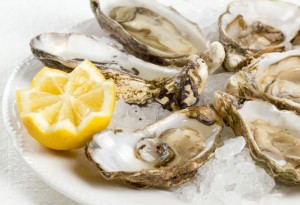Massachusetts health officials are warning that oysters harvested from Cape Cod Bay may be contaminated with Vibrio parahaemolyticus, a bacteria that causes about 4,500 cases of foodborne illness every year.
 That area has tidal flats with shallow water that can become very warm during the day. In just the right conditions of warm temperatures and the water’s salt content, the bacteria grows very quickly in the shellfish. Then when those oysters are eaten raw or undercooked, the bacteria can make people sick.
That area has tidal flats with shallow water that can become very warm during the day. In just the right conditions of warm temperatures and the water’s salt content, the bacteria grows very quickly in the shellfish. Then when those oysters are eaten raw or undercooked, the bacteria can make people sick.
The illness is characterized by watery diarrhea, cramping, nausea, fever, chills, and vomiting. Most people recover within a few days, but some people, especially those in high risk groups, can become seriously ill. Last year, five people became very ill with V. parahaemolyticus poisoning.
The FDA has ordered the Massachusetts Division of Marine Fisheries and the Department of Public Health to develop a plan to help reduce the incidence of this bacteria in oysters. The harvesting process can take a long time, leaving the oysters in very warm conditions for hours.
One solution is to rapidly cool the oysters after harvest, since chilling the shellfish quickly can slow bacterial growth. Another solution, which is less popular, is limiting the season for selling oysters meant to be eaten raw, since cooking destroys the bacteria.
For more information on seafood safety and preparation, you can read information at the Seafood Network Information Center at UC Davis.




